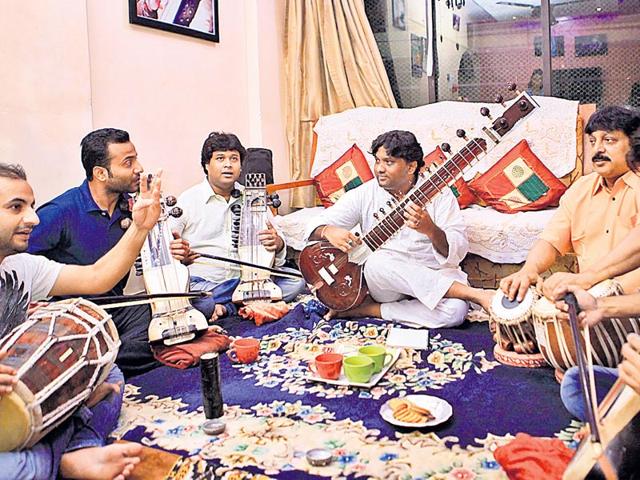Tuning in to preserve the musical past of Sikar gharana
The determination to preserve the Khan family's musical tradition has brought its scattered members together in the past 15 days. Six musicians from three generations of the family are gathered, to rehearse for their performance at the Rajasthan International Folk Festival.
It's the hottest September day on record in Mumbai. Temperatures have soared to a scorching 38 degrees C and tempers are high among rush-hour commuters. But inside the two-bedroom Khan home in the suburban area of Malvani, soothing tones instantly calm the nerves.

Six musicians from three generations of the family are gathered, to rehearse for their performance at the Rajasthan International Folk Festival (RIFF) in Jodhpur, Rajasthan, next week.
A total of 12 members of the Khan family will perform at the event together.
"This is the first time so many musicians from a single gharana will perform together at the festival," says director of RIFF Divya Bhatia.
It is also the first time so many members of the Khan family will perform on one stage.
"We are excited to be representing the Sikar gharana on the tabla, dholak, sitar and sarangi- showcasing compositions framed by our forebears and a raga created by a member of the family nine generations ago," says Imran Khan, 31, an eighth-generation sitar player.
It all began when Imran performed at the festival in 2012.
"Until then, I didn't know the Sikar gharana existed," says Bhatia.
"When Imran told me about his lineage, I thought it would be a great idea to have all the musicians from this relatively unknown house of music play together in their hometown."
Even more fitting, the gharana frames classical compositions that are rooted in the sounds of the sarangi and sitar- with a strong influence of Rajasthani folk music in the compositions.
"This is rare to find," says Bhatia. This mélange began in the mid-1930s, when Ustad Azeem Khan was appointed court musician by Maharaja Kalyan Singh of Sikar, a town 200 km from Jaipur.
After Independence, when the princely kingdoms were dissolved, Azeem Khan's son Ustad Gulab Khan moved to Jodhpur and the gharana flourished there, with each successive generation continuing the family tradition.
"Growing up, musical instruments were our toys," says Ishteyak Khan, 30, a percussionist. "Music is in our blood. We are born with it and determined to keep the tradition alive," adds Shahrukh Khan, 21, a ninth-generation sarangi player.
The determination to preserve the family's musical tradition is what has brought its scattered members together, coordinating and practicing on different instruments for eight hours a week for the past 15 days.
"We understand each other's cues and are intrinsically tuned to each others' music," says Sabir Khan, 28, a sarangi player.
"We all are well versed with our grandmother Fatima Gulab Khan's composition 'Naina more taras gaye' and compositions in raag Rasmohini by my late father Ustad Sultan Khan. These are among the compositions we will play at the concert."
The strain of earning a living through music, however, has compelled some members of the current generation to seek other means of livelihood.
"Some of my cousins have gone into trade. Some have even moved abroad," says Imran.
It was financial pressures that drove the family to move from Jodhpur to Mumbai. In the 1950s and '60s, with no royal patronage remaining, Ustad Sultan Khan spent 13 years working with All India Radio in Rajkot, his only means of earning a living. It was there that singer Lata Mangeshkar first heard him perform. She sought him out and insisted that he move to Mumbai, which he did in 1968.
The city's then-vibrant concert circuit saw the musician gain considerable renown and Ustad Sultan Khan went on to receive a Padma Bhushan. He was also a prominent vocalist and sarangi player on the international music circuit, performing with global music stars such as George Harrison of The Beatles (in 1974) and on the Dark Horse US Tour with Madonna in 1997. And he performed on the sarangi for the soundtracks of films such as Gandhi (1982) and Sholay (1975).
Ustad Sultan Khan passed away in 2011, but his legacy in the city remained.
"After he established himself in Mumbai, most of us also left our hometown of Jodhpur to come here," says Imran.
At one point, in fact, the entire family lived in one building in Borivali, but as the family grew, members spread out across the city. "We are extremely excited that so many of us- some from Mumbai and some from Jodhpur - will now perform together in our hometown. It is going to be a special concert," says Imran.
Get more updates from Bollywood, Hollywood, Music and Web Series along with Latest Entertainment News at Hindustan Times.



